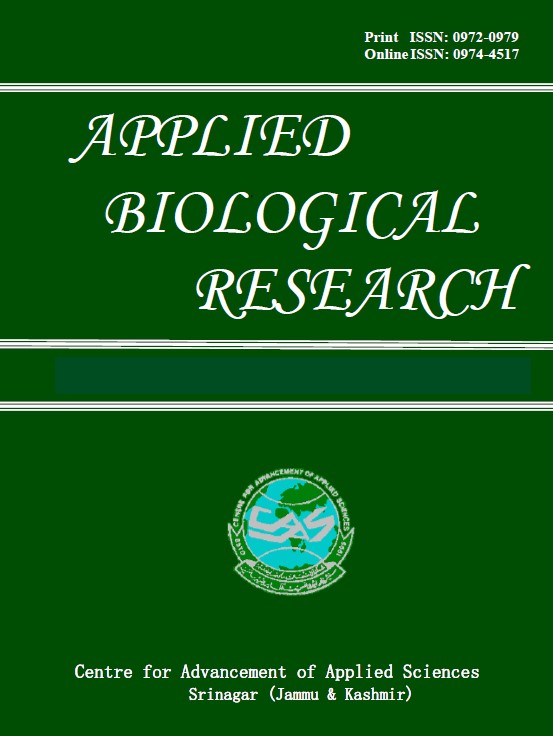In vitro ANTI-CANCER EFFECTS OF QUERCETIN ON TRIPLE NEGATIVE BREAST CANCER CELL LINE
DOI:
https://doi.org/10.48165/abr.2024.26.01.6Keywords:
Doxorubicin, MDA-MB-231, MTT assay, quercetin, TNBCAbstract
Phytochemicals are widely being explored for their cancer preventive properties in today’s oncotherapy. Quercetin is a major constituent of various dietary products and its anti-cancer potential was explored on different cancer cell lines. The present study was conducted to find out the anti-proliferative effects of quercetin on human triple negative breast cancer cell line MDA-MB The anti-cancer potential of quercetin, nano-quercetin and doxorubicin at various concentrations were assessed by cellular cytotoxicity (MTT) assay. The IC50 values of quercetin, nano-quercetin and doxorubicin on MDA-MB 231 cell line were 394.8, 204.6 and 17.17 μM, respectively. In vitro anti-cancer effects of these drugs were manifested as apoptosis and cellular toxicity. The cytotoxicity was moderate in quercetin, remarkable in nano-quercetin and strong in doxorubicin treatments. The in vitro anti-cancer effect of quercetin was comparable with the standard drug doxorubicin. Considering the potential side effects of doxorubicin, the quercetin might be explored with further studies in the treatment of mammary tumours in animals and humans.
Downloads
References
Asgharian, P., Tazekand, A.P., Hosseini, K., Forouhandeh, H., Ghasemnejad, T., Ranjbar, M., Hasan, M., Manoj Kumar, Beirami, S.M., Tarhriz, V., Soofiyani, S.R., Kozhamzharova, L., Sharifi-Rad, J., Daniela Calina and Cho, W.C. 2022. Potential mechanisms of quercetin in cancer prevention: focus on cellular and molecular targets. Cancer Cell International, 22(257): 1-20.
Effects of quercetin on TNBC cell line 5
Carey, L.A., Dees, E.C., Sawyer, L., Gatti, L., Moore, D.T., Collichio, F., Ollila, D.W., Sartor, C.I., Graham, M.L. and Perou, C.M. 2007. The triple-negative paradox: Primary tumour chemosensitivity of breast cancer subtypes. Clinical Cancer Research, 13(8): 2329-2334.
Ghasemi, M., Turnbull, T., Sebastian, S. and Kempson, I. 2021. The MTT assay: Utility, limitations, pitfalls, and interpretation in bulk and single-cell analysis. International Journal of Molecular Sciences, 22(12827): 1-30.
Guardia, T., Rotelli, A.E., Juarez, A.O. and Pelzer, L.E. 2001. Anti-inflammatory properties of plant flavonoids: Effects of rutin, quercetin and hesperidin on adjuvant arthritis in rat. Farmaco, 56(9): 683-687.
Gupta, S.C., Kim, J.H., Prasad, S. and Aggarwal, B.B. 2010. Regulation of survival, proliferation, invasion, angiogenesis and metastasis of tumour cells through modulation of inflammatory pathways by nutraceuticals. Cancer Metastasis Reviews, 29(3): 405-434.
Hu, X.T., Ding, C., Zhou, N. and Xu, C. 2015. Quercetin protects gastric epithelial cell from oxidative damage in vitro and in vivo. European Journal of Pharmacology, 754(5): 115-124. Morel, I., Lescoat, G., Cogrel, P., Sergent, O., Pasdeloup, N., Brissot, P., Cillard, P. and Cillard, J. 1993. Antioxidant and iron-chelating activities of the flavonoids catechin, quercetin and diosmetin on iron-loaded rat hepatocyte cultures. Biochemical Pharmacology, 45(1): 13-19. Nguyen, L.T., Lee, Y., Sharma, A.R., Park, J., Jagga, S., Sharma, G., Lee, S. and Nam, J. 2017. Quercetin induces apoptosis and cell cycle arrest in triple-negative breast cancer cells through modulation of Foxo3a activity.Korean Journal of Physiology and Pharmacology, 21(2): 205-213. Oncul, S. and Ercan, A. 2017. Discrimination of the effects of doxorubicin on two different breast cancer cell lines on account of multidrug resistance and apoptosis. Indian Journal of Pharmaceutical Sciences, 79(4): 599-607.
Podo, F., Buydens, L.M.C., Degani, H., Hilhorst, R., Klipp, E., Gribbestad, I.S., Huffle, S.V., Laarhoven, H.W.M., Luts, J., Monleon, D., Postma, G.J., Marra, N.S., Santoro, F. and Dale, A.B. 2010. Triple-negative breast cancer: Present challenges and new perspectives. Molecular Oncology, 4(3): 209-229.
Rahmanand, S.N.A. and Jameel, S.S. 2014. Quercetin nanoparticles: Preparation and characterization. Indian Journal of Drugs, 2(3): 96-103.
Sharmila, G., Bhat, F.A., Arunkumar, R., Elumalai, P., Singh, P.R., Senthilkumar, K. and Arunakaran, J. 2014. Chemopreventive effect of quercetin, a natural dietary flavonoid on prostate cancer in in vivo model. Clinical Nutrition, 33(4): 718-726.
Staedler, D., Idrizi, E., Kenzaoui, B.H. and Eanneret, L.J. 2011. Drug combinations with quercetin: Doxorubicin plus quercetin in human breast cancer cells. Cancer Chemotherapy and Pharmacology, 68(5): 1161-1172.
Sultan, A.S., Khalil, A.I.M., Sami, B.M., Alkhurij, A.F. and Sadek, O. 2017. Quercetin induces apoptosis in triple-negative breast cancer cells via inhibiting fatty acid synthase and β-catenin. International Journal of Clinical and Experimental Pathology, 10(1): 156-172.
van Rijn, J. and van den Berg, J. 1997. Flavonoids as enhancers of x-ray-induced cell damage in hepatoma cells. Clinical Cancer Research, 3(10): 1775-1779.
Wen, Z., Liang, Y., Deng, S., Zou, L., Xie, X., Yang, J. and Wu, Y. 2019. Talin2 regulates invasion of human breast cancer MDA-MB-231 cells via alteration of the tumor microenvironment. Oncology Letters, 17: 4835-4842.
Wu, T., Yen, F., Lin, L., Tsai, T., Lin, C. and Cham, T. 2008. Preparation, physiochemical characterisation and antioxidant effects of quercetin nanoparticles. International Journal of Pharmaceutics, 346(1-2): 160-168.
Yang, T., Kong, B., Gu, J.W., Kuang, Y.Q., Cheng, L., Yang, W.T., Xia, X. and Shu, H.F. 2014. Anti apoptotic and anti-oxidative roles of quercetin after traumatic brain injury. Cellular and Molecular Neurobiology, 34(6): 797-804.

